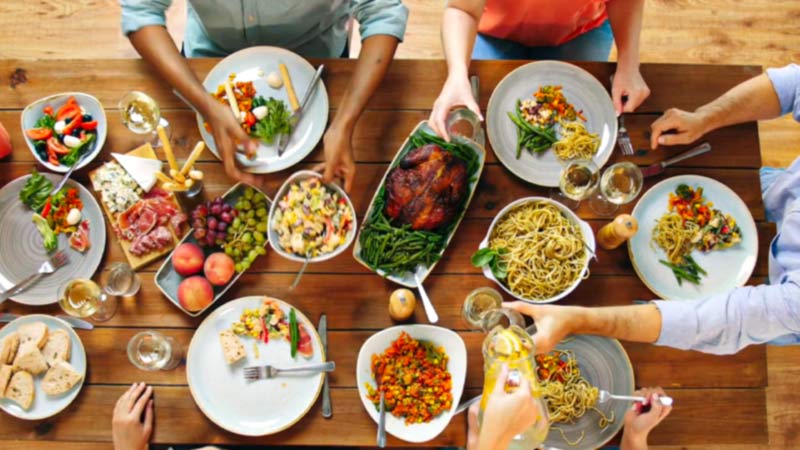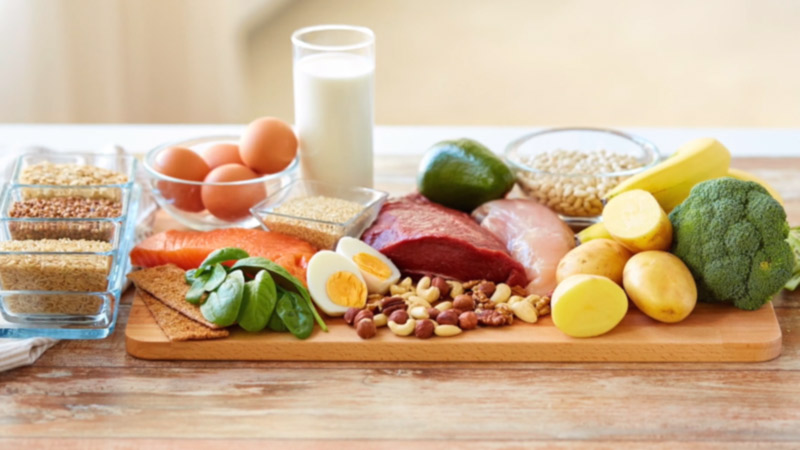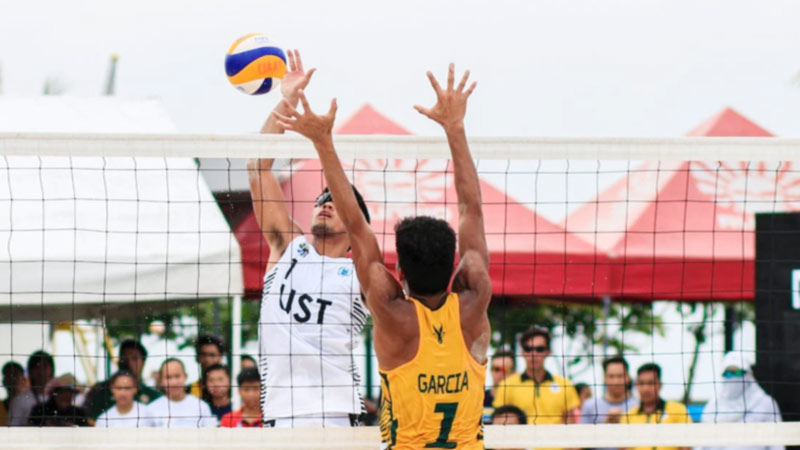In the realm of competitive sports, where split-second decisions and peak physical performance collide, the significance of proper nutrition cannot be overstated.
Volleyball, a dynamic sport demanding explosive power and unwavering stamina, necessitates a thoughtful approach to fueling the body.
This guide is a compass for volleyball players seeking to elevate their game through dietary choices. By delving into the intricacies of what constitutes the ideal diet, we unravel the symbiotic relationship between food and athletic excellence.
As the court becomes a canvas for skill and strategy, let nutrition be the brush that paints success, stroke by stroke. So, let’s get started.
Why Specific Diet Is Essential for Volleyball Players?
Volleyball demands more than just agility and precision; it’s a sport that relies heavily on explosive power, endurance, and lightning-quick reflexes. To excel on the court, athletes must recognize the pivotal role of nutrition in achieving and maintaining peak performance.
A specific diet tailored to the unique needs of volleyball players isn’t just desirable – it’s essential.
Energy Demands
Volleyball is a high-intensity sport that requires rapid bursts of energy followed by short periods of rest. An appropriate diet ensures a steady supply of carbohydrates, the body’s primary energy source, enabling players to deliver consistent performance throughout the game.
Muscle Recovery
The sport places immense strain on muscles, leading to micro-tears and fatigue. Adequate protein intake is crucial for repair and growth, allowing players to bounce back quickly and stay in prime condition.
Endurance and Hydration
Prolonged matches and intense practices can lead to dehydration and electrolyte imbalances. Proper hydration, along with the right balance of nutrients, helps sustain endurance and mental clarity, both of which are vital during critical moments of play.
Injury Prevention
A diet rich in antioxidants, vitamins, and minerals supports the immune system and reduces the risk of injuries. Nutrients like vitamin C and zinc aid in collagen production, strengthening joints and tendons.
Volleyball players have finely tuned athletes requiring a diet that aligns with their physical demands. A well-crafted nutrition plan serves as the cornerstone of their success, enabling them to reach higher levels of performance and contribute significantly to their team’s triumphs.
As the court becomes a stage for showcasing skills, let a specific diet be the secret weapon that fuels their journey to victory.
Ideal Diet Chart for a Volleyball Player

Achieving peak performance on the volleyball court requires a well-balanced diet that caters to the unique demands of the sport. Here’s an ideal diet chart that outlines the key nutrients and meal structure to fuel a volleyball player’s success:
Breakfast (7:00 AM)
- Scrambled eggs or tofu scramble
- Whole grain toast
- Greek yogurt with mixed berries
- Hydration: Water or low-sugar sports drink
Mid-Morning Snack (10:00 AM)
- Banana or apple slices with almond butter
- Hydration: Water
Lunch (12:30 PM)
- Grilled chicken or tempeh wrap with whole grain tortilla
- Mixed greens salad with colorful veggies and olive oil vinaigrette
- Quinoa or brown rice
- Hydration: Water
Afternoon Snack (3:00 PM)
- Carrot and cucumber sticks with hummus
- Nuts and dried fruits trail mix
- Hydration: Water
Pre-Workout Snack (5:00 PM)
- Energy bar with balanced macros (low sugar, high protein, moderate carbs)
- Hydration: Water
Post-Workout Recovery (7:30 PM)
- Baked salmon or tofu
- Steamed broccoli and sweet potatoes
- Mixed greens salad
- Hydration: Water or electrolyte-rich drink
Dinner (9:00 PM)
- Whole grain pasta with lean turkey or lentil-based sauce
- Roasted vegetables
- Hydration: Herbal tea or water
Before Bed Snack (10:30 PM)
- Low-fat cottage cheese or Greek yogurt
- Hydration: Water
Nutrition Tips
- Focus on whole, unprocessed foods to provide essential nutrients.
- Prioritize lean proteins like chicken, fish, tofu, tempeh, and legumes for muscle recovery.
- Incorporate complex carbohydrates such as whole grains, quinoa, and sweet potatoes for sustained energy.
- Include a variety of colorful vegetables and fruits for antioxidants, vitamins, and minerals.
- Hydrate consistently throughout the day, aiming for at least 8 glasses of water.
- Avoid excessive sugars, refined foods, and saturated fats.
- Adjust portion sizes based on individual energy expenditure and body composition goals.
Remember, this diet chart serves as a general guideline. Consulting with a registered dietitian or nutritionist can provide personalized recommendations tailored to individual needs and goals.
By following a well-structured diet, volleyball players can optimize their performance and enhance their potential on the court.
Healthy Snacks for Volleyball Players

In the fast-paced world of volleyball, where split-second reactions and enduring energy are paramount, the importance of well-timed and nutritious snacks cannot be overlooked. Smart snacking not only sustains energy levels but also supports muscle recovery and mental focus.
Here are some best snacks for volleyball players that can keep them at the top of their game:
Fresh Fruit
Nature’s energy boosters, and fruits like bananas, oranges, and berries provide a quick infusion of carbohydrates and vitamins. Their natural sugars offer a rapid energy source, while the fiber promotes sustained energy release.
Greek Yogurt
Packed with protein and probiotics, Greek yogurt aids in muscle recovery and digestion. Adding some honey or fruit can enhance taste and provide additional carbohydrates for energy.
Trail Mix
A mix of nuts, seeds, and dried fruits offers a balanced blend of healthy fats, protein, and carbohydrates. It’s a convenient and portable option for replenishing energy during breaks.
Nut Butter with Whole Grain Crackers
Nut butters like almond or peanut butter paired with whole-grain crackers offer a satisfying combination of protein and complex carbs, supporting sustained energy levels.
Hummus and Veggie Sticks
Hummus, made from chickpeas, is a protein-rich dip that pairs well with colorful veggie sticks. This combination provides a range of nutrients, including fiber and vitamins.
Rice Cakes with Avocado
Rice cakes topped with avocado slices create a blend of easily digestible carbs and healthy fats. Avocado is rich in potassium, an electrolyte that aids in muscle function.
Low-Fat Cheese and Whole Grain Bread
A slice of low-fat cheese on whole-grain bread delivers protein and complex carbohydrates, making it a balanced snack for refueling.
Energy Bars
Opt for natural, low-sugar energy bars containing a mix of nuts, dried fruits, and seeds. Look for options with minimal ingredients and no added sugars.
When it comes to excelling in volleyball, the right snacks can make a world of difference. These wholesome options offer a combination of nutrients that sustain energy, promote muscle recovery, and keep players mentally sharp.
By incorporating these smart snacking choices into their routines, volleyball players can ensure they’re always at their best, whether during practice, games, or tournaments.
Why Do Volleyball Players Eat Bananas?
Bananas have emerged as a popular choice among athletes, including volleyball players, for good reason. These yellow wonders offer a plethora of benefits that align perfectly with the demands of the sport. Here’s why volleyball players often reach for bananas:
Instant Energy Boost
Volleyball is characterized by explosive movements and quick bursts of energy. Bananas are a rich source of easily digestible carbohydrates, primarily in the form of natural sugars like glucose, fructose, and sucrose.
These sugars provide a rapid energy source, helping players maintain their agility and power throughout the game.
Muscle Function and Cramp Prevention
The high potassium content in bananas contributes to proper muscle function and fluid balance.
Volleyball players are prone to muscle cramps due to intense movements and sweating. Potassium helps prevent and alleviate cramping by regulating muscle contractions and maintaining electrolyte balance.
Digestive Ease
During a game or practice, players may not have the luxury of consuming a heavy meal. Bananas are gentle on the stomach and easy to digest, making them an ideal snack option that doesn’t weigh players down or cause discomfort.
Hydration Support
Bananas also contain water and electrolytes, including potassium and magnesium, which help maintain hydration and replenish lost minerals due to sweating.
Vitamins and Nutrients
Bananas are rich in essential vitamins and nutrients, including vitamin C, vitamin B6, and dietary fiber. These contribute to immune function, overall well-being, and digestive health.
Convenience
Bananas come in their own natural packaging, making them a portable and mess-free option for on-the-go snacking, whether it’s during a match, practice, or tournament.
In a sport where split-second decisions and peak performance are crucial, bananas offer a simple and effective solution to maintain energy levels, muscle function, and overall vitality.
They serve as a natural, nutrient-packed source of sustenance that keeps volleyball players at the top of their game.
Do Volleyball Players Need to Change Diet Plants Before Tournaments?
Preparing for a volleyball tournament requires a strategic approach to nutrition. As the intensity and duration of matches increase, players need to make slight adjustments to their diet plans to ensure peak performance and rapid recovery.
Here’s why altering their dietary strategies before tournaments can be beneficial:
Increased Energy Demands
Tournaments involve multiple matches over a short period, often in a single day. Volleyball players expend significant energy during each game.
Adjusting their diet to include slightly more carbohydrates in the days leading up to the tournament can help build glycogen reserves, providing ample fuel for sustained performance.
Focus on Complex Carbs
Carbohydrates are the body’s primary energy source. Prioritize complex carbohydrates like whole grains, quinoa, and sweet potatoes.
These offer a steady release of energy and help players avoid energy crashes during matches.
Optimal Hydration
Proper hydration is crucial for maintaining stamina, concentration, and muscle function. In the days leading up to the tournament, ensure players are consistently drinking water to stay well-hydrated.
On tournament days, monitor their hydration closely, and consider incorporating electrolyte-rich drinks if matches are intense and prolonged.
Strategic Snacking
During tournaments, time between matches might be limited. Pack easily digestible, nutrient-dense snacks like bananas, energy bars, or trail mix to provide quick energy and keep players fueled without causing discomfort on the court.
Post-Match Recovery
After each match, prioritize quick and effective recovery. Consuming a snack or meal that combines protein and carbohydrates within an hour of playing helps replenish glycogen stores and supports muscle repair.
Limit Processed Foods
While the occasional treat is acceptable, avoid excessive consumption of processed foods, sugary snacks, and high-fat items that might leave players feeling sluggish.
Individual Variations
Every player’s nutritional needs can vary based on factors such as body composition, metabolism, and personal preferences.
Some players might benefit from experimenting with different foods or meal-timing strategies during training sessions prior to the tournament to find what works best for them.
Consult a Professional
If players are unsure about making dietary adjustments, consulting a registered dietitian or nutritionist can provide personalized guidance based on individual requirements.
In essence, adjusting diet plans before tournaments is a strategic move to optimize energy levels, enhance performance, and promote efficient recovery.
With a well-structured approach to nutrition, volleyball players can elevate their game and shine brightly during crucial tournament moments.
FAQs
What are the key nutritional needs of volleyball players?
Volleyball is a physically demanding sport that demands quick bursts of energy, agility, and endurance. To meet these requirements, players should focus on a balanced diet comprising carbohydrates for energy, lean proteins for muscle repair, and healthy fats for overall well-being.
Adequate hydration is also essential to prevent fatigue and maintain optimal performance.
When should volleyball players eat before a game or practice?
Timing is crucial. Players should aim to consume a well-balanced meal rich in carbohydrates, moderate in protein, and low in fats about 2 to 3 hours before a game or intense practice.
For a quick energy boost closer to the session, a light snack with easily digestible carbs, like a banana or an energy bar, about 30 minutes to an hour before, can be beneficial.
What are some smart snack choices for volleyball players during matches or long tournaments?
During extended periods of play, easily digestible snacks are ideal. Fresh fruits, such as oranges or grapes, offer hydration and a quick energy source. Trail mix, yogurt cups, and whole-grain granola bars are also excellent choices to refuel without causing digestive discomfort.
How can volleyball players ensure proper hydration?
Staying hydrated is paramount to performance and recovery. Volleyball players should drink water consistently throughout the day, and particularly during matches or practices.
Sports drinks can be useful for longer sessions as they replace electrolytes lost through sweat. Monitoring urine color can serve as a simple indicator of hydration status – pale yellow is the goal.
Are there specific foods to prioritize for muscle recovery?
Post-game or post-practice nutrition is vital for muscle recovery and growth. Lean protein sources like chicken, fish, tofu, or beans combined with complex carbohydrates such as brown rice, quinoa, or sweet potatoes can aid in replenishing glycogen stores and promoting muscle repair.
Wrapping Up
In the relentless pursuit of volleyball greatness, one’s dietary choices emerge as a decisive factor. The path to excellence is paved with balanced nutrition, ensuring a robust supply of energy, swift recovery, and enduring vitality.
By embracing the fusion of carbohydrates, proteins, and healthy fats, volleyball players fortify their prowess. Adequate hydration and astute snack decisions add to their arsenal, fostering endurance during long contests.
As the final whistle echoes, the echoes of well-chosen post-game nutrition reverberate, mending muscles and amplifying growth.
The court becomes not just a battleground of skills but a proving ground of nutritional wisdom. With each bite, players engrave their determination, rewriting their legacy one match at a time.
Hope you’ve got the point properly. Thanks for your support.







